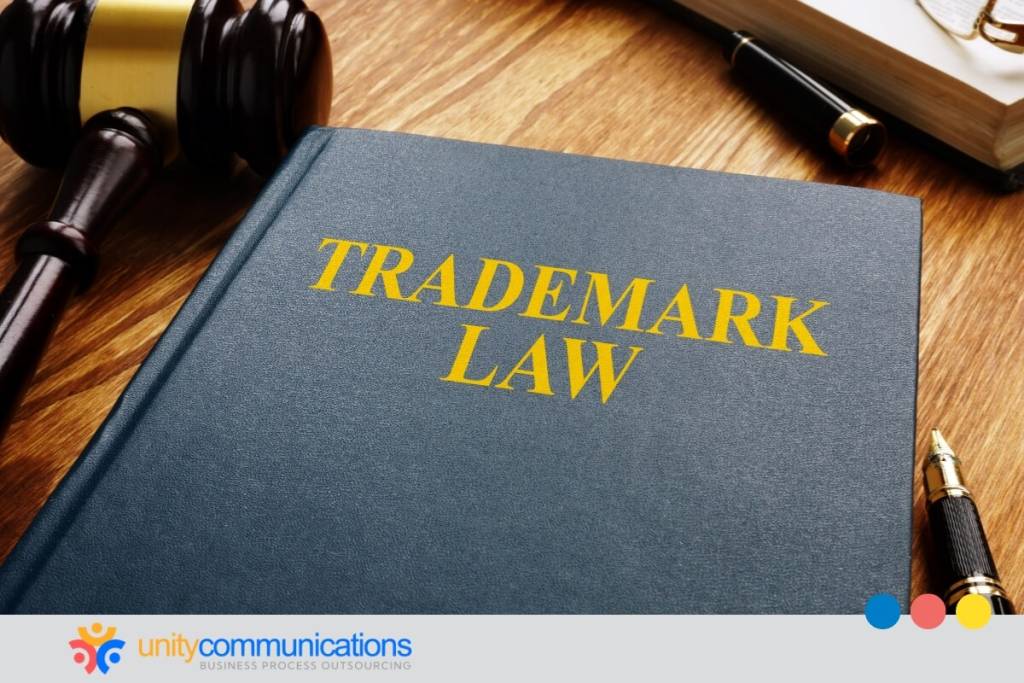Table of Contents
Trademarks play a crucial role in defining the identity of a business process outsourcing (BPO) company. Safeguarding these symbols is essential for preserving the company’s reputation and brand integrity.
Thus, BPO firms can establish a robust market presence and reduce legal risks by effectively comprehending and utilizing trademark laws.
This article explores how BPO providers manage trademark laws, providing insights into compliance, registration procedures, and enforcement strategies.
An Introduction to BPO and Trademark Laws

BPO providers must strictly adhere to trademark laws, as the latter protect intellectual property (IP) and promote fair competition. Here are some key aspects of trademark laws and their significance to BPO organizations.
Brand Protection
Trademarks serve as a form of brand identification. In the BPO industry, where companies often build their reputation based on the quality of their services, protecting the brand is essential.
BPO companies invest heavily in building a positive brand image. Trademark laws help safeguard this investment by preventing other businesses from using similar or identical marks that could confuse consumers.
Client Trust and Confidentiality
BPO firms frequently handle sensitive and confidential information on behalf of their clients. As such, clients choose their BPO service provider based on its established reputation, often reflected in its logos and emblems. Similar to household names, trademarks can provide a sense of familiarity and are associated with trust and reliability.
Trademark laws help prevent the unauthorized use of a company’s service mark, reducing the risk of clients being misled about the source of third-party services.
Global Operations
Many BPO companies operate globally, serving clients in different jurisdictions. Trademark protection is essential for maintaining brand consistency and preventing infringement in various regions.
Understanding and navigating international trademark laws is crucial for BPO firms to expand their operations without facing legal challenges related to brand infringement.
Risk Mitigation
Trademark applications provide a legal presumption of ownership and exclusive rights to use the symbol in connection with specific goods or services. They can be instrumental in mitigating the risk of legal disputes over brand identity.
BPO companies can register their trademarks to establish a solid legal foundation for their brand, reducing the likelihood of costly litigation.
Quality Control
Trademarks are associated with a certain level of quality and consistency. BPO firms use trademarks to signal their commitment to delivering high-quality services.
Trademark laws enable companies to maintain control over the use of their marks, ensuring that only authorized parties can use the mark in connection with services meeting the company’s standards.
The Process of Registering BPO Trademarks
So, what must BPO companies do to apply for a trademark? Registering trademarks involves a series of steps to secure legal protection for your brand. Here is a general overview of the process:
- Search for a suitable trademark. Before applying, conduct a thorough trademark search to ensure that the proposed mark is not already in use or registered by another entity. This step helps avoid potential legal issues and conflicts.
- Identify classes of goods and services. Trademarks are registered for specific classes of goods and services. Identify the classes relevant to the BPO services your company provides. BPO services may fall under various classes, such as business process outsourcing, consulting, or related fields.
- Create a memorable trademark. Develop a unique trademark that distinguishes your BPO services from others in the industry. A strong trademark is more likely to receive approval from trademark offices.
- File a trademark application. Apply with the concerned IP office. This process often involves submitting a detailed application form, including information about the mark, its intended use, and the classes of goods or services it applies to.
- Pay relevant fees. Pay the required filing fees associated with the trademark application. The fees may vary depending on the jurisdiction and the number of classes for which you are registering the mark.
- Wait for the examination process. The IP office examines your application to ensure it meets legal requirements. It checks for conflicts with existing trademarks and assesses your mark’s distinctiveness.
- Respond to office actions. You may receive an office action if the IP office raises concerns or issues during the examination. Respond promptly and address any objections the office raises to move the application forward.
- Publish the accepted trademark. Once the trademark application is accepted, it is typically published in a public database or a gazette. Publication allows third parties to oppose the registration if they believe it infringes on their existing rights.
- Undergo an opposition period. After publication, third parties can oppose the registration of your trademark for a certain period. If no objections are filed, the application proceeds to registration.
- Successfully register the trademark. The patent and trademark office will issue a registration certificate when opposition issues are resolved in your favor. This certificate provides legal protection for your trademark in specified classes of goods and services.
Common Trademark Issues in BPO

BPO companies and operations might encounter several issues with trademark laws. Addressing these issues is crucial for protecting a company’s brand and reputation. Here are some common trademark issues faced by BPO companies:
- Similarity and likelihood of confusion
- Generic or descriptive terms
- Failure to conduct a proper trademark search
- Inadequate protection of trademarks
- International trademark challenges
- Changes in business activities
- Licensing and quality control
- Domain name disputes
- Counterfeiting and unauthorized use
- Failure to monitor and enforce trademark rights
Measures to Ensure Adherence to Trademark Laws
In 2021, there was a 3.6% rise in global patent applications. For BPO companies and vendors, ensuring adherence to trademark laws is crucial for protecting the brand and IP. Here are a few tips to accomplish this goal:
- Choose a distinctive trademark. Select a trademark that is distinctive and not generic or descriptive. Unique marks are more likely to get registered and provide more robust protection against infringement.
- Identify and classify products and services. Clearly define the goods and services associated with your trademark during registration. Proper classification ensures that your trademark is protected in the areas where you operate.
- Educate employees. Ensure your employees know the importance of trademarks and the company’s registered marks. Educate them on the proper use of trademarks to avoid unintentional infringement.
- Create brand guidelines. Develop and distribute brand guidelines that specify how your trademarks should be used. Provide clear instructions on logo usage, color schemes, and other elements contributing to your brand identity.
- Use trademark notices. Display the ® symbol for registered trademarks and the ™ symbol for unregistered trademarks. These signs notify others of your claim to the mark and can be useful in legal proceedings.
- Guarantee international protection. If your business operates internationally, consider registering trademarks in relevant jurisdictions to ensure protection in those markets. Understand and comply with the trademark laws of each jurisdiction.
Implications and Legal Ramifications of Trademark Infringement

Trademark infringement occurs when one party uses a trademark that is identical or confusingly similar to a registered trademark owned by another party. The implications and legal ramifications of trademark infringement can be significant and may include the following:
- Cease and desist orders. The owner of the trademark that has been infringed upon has the option to send a cease-and-desist letter to the party accused of the infringement. This letter requests that the alleged infringer immediately cease using the mark. It often includes a deadline for compliance and a warning of legal action. After receiving a cease and desist letter, it’s vital to understand the necessary steps to take. You can find detailed guidance on the specific actions and considerations in these steps after receiving cease and desist letter. This will help in effectively responding within the legal framework.
- Negotiation and settlement. Parties involved in a trademark infringement dispute may negotiate to reach a settlement. Settlements often involve the alleged infringer agreeing to cease use of the infringing mark and possibly paying damages or royalties to the trademark owner.
- Injunctions. Trademark owners can seek injunctive relief from the court, requesting an order prohibiting the alleged infringer from using the infringing mark. Injunctions can be temporary or permanent and are intended to prevent further harm to the trademark owner.
- Damages and monetary compensation. If the court finds that trademark infringement has occurred, the infringing party may be liable for damages ranging from $1,000 to $200,000. Damages can include actual damages (financial losses suffered by the trademark owner) and, in some cases, statutory damages set by law.
The Bottom Line
For the BPO industry and companies, trademark laws are of great significance as they contribute to brand protection, client trust, and the overall integrity of business relationships.
Businesses must be aware of the potential legal consequences of trademark infringement and take proactive steps to protect their trademarks through registration, monitoring, and enforcement efforts.
Are you on the hunt for a reputable BPO company? Let’s connect to discuss how Unity Communications can help!




